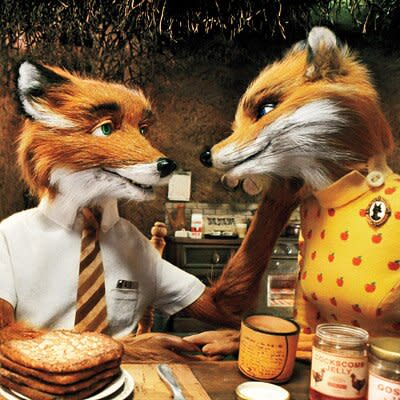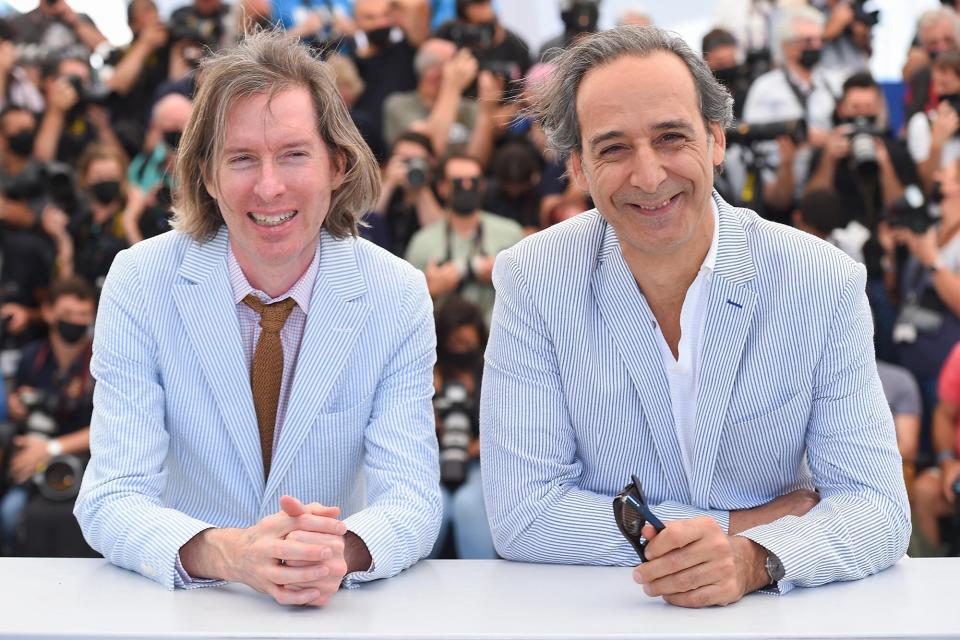Fantastic Mr. Fox composer Alexandre Desplat on joys of working with 'mischievous' Wes Anderson
- Oops!Something went wrong.Please try again later.
- Oops!Something went wrong.Please try again later.
- Oops!Something went wrong.Please try again later.
- Oops!Something went wrong.Please try again later.
It's Wes Anderson week at EW! Ahead of the Oct. 22 release of The French Dispatch, we're celebrating the auteur's singular filmography with a series of throwbacks celebrating his most beloved titles. Here, composer Alexandre Desplat, one of Anderson's frequent collaborators, looks back on creating the childlike — but not childish — score for Fantastic Mr. Fox.
When The French Dispatch hits theaters this Friday, it will commemorate the fifth collaboration between writer-director Wes Anderson and composer Alexandre Desplat.
The partnership has been a fruitful one, producing five gorgeous and unique scores, three of which received an Oscar nomination, including The Grand Budapest Hotel, which won the Academy Award for Best Original Score.
On the eve of their fifth outing, EW spoke to Desplat about the collaboration that started it all — 2009's Fantastic Mr. Fox. Below, the two-time Oscar winner looks back at his time working on the animated film and what he enjoys about working with the "mischievous" Anderson.
The beginnings
Paris-born Desplat says it all began with meetings between the two at a Paris editing bay where Anderson, a known Francophile, was working on the film. "First of all, I was very lucky to meet Wes because he's a great creator; he has a real-world of his own that belongs to only him," Desplat explains. "It's always a blessing for a composer to start working early on with a director who has so much personality, and who likes music and uses your music so well. That's where we started." Desplat says he went into the initial discussions not having seen the film or the puppets used in it, but he had read the original Roald Dahl novel upon which the film is based, so he was familiar with the characters. Once he watched the film and met with Anderson, he realized the first thing the score would need to capture. "He's very mischievous, and that's something that when you start working with Wes that you have to understand and capture first," he says.
The next order of business was the melody. "I knew he wanted melodies, and in some way, something that would be childlike, not childish, but childlike, that would have a simplicity that sounds simple, but at the same time, is not simplistic. It's something that you can make a scene with," Desplat explains.
The other issue to sort out in the early stages was the size of the orchestra. As Desplat explains, American animated films tend to have a large orchestra, but he felt "uncomfortable" with that idea because Mr. Fox had "these little puppets that were so cute," and he worried a large orchestra would overpower them. "I suggested that we write for a mini-symphonic orchestra, but with many instruments, and we chose baby instruments if I could put it that way — a string quartet or string quintet and not a full string orchestra, the brass section but with only one piece of instrument per section, etc, etc. Percussion, we used only little percussions — glockenspiels, triangles, little pieces — and it created a very intimate sound that could sound rather big, or maybe medium-big, but different from what the symphonic orchestra would be," he says. "So the melodies' simplicity, the tiny instruments, all that created a very different sound that was very exciting for us. And that's where we started."

'Fantastic Mr. Fox' still
"Boggis, Bunce and Bean"
Working with the director for the first time, Desplat remembers "discovering [Anderson's] intelligence, his virtuosity, his passion for cinema, his love of music, and again, how mischievous he can be." As an example of the latter, Desplat recalls that Anderson wanted to make one of the film's villains, Bean (voiced by Michael Gambon), look like Dahl as a fun nod to the film's source material. Another fond memory is recording the number "Boggis, Bunce and Bean," which features a boy's choir. To ease the nerves of the young singers, Anderson actually brought all the puppets from the film to the recording studio. "It was a great moment because Wes had brought all the puppets of the film to show to the boys so they would not be nervous and they could be relaxed and enjoy the moment," he says. "These boys were between 8 and 11 maybe, so the perfect age to enjoy the film and at the same time enjoy the characters. And so that's the kind of work we do with Wes."
A (whistling) star is born
Not only was Fantastic Mr. Fox the first time Desplat worked with Anderson, but it was also the first time the composer appeared in a starring role of sorts in one of his scores.
"There's a character who's a mean rat, and we decided to do a piece with a whistle for him, which I whistled actually. That was my debut in American cinema as a whistler, which I dabbled in again for The Shape of Water, in which I whistled the main title," he reveals. "That's another fun thing to do, you know, because there's not much whistling in movies in general. There used to be in the '40s, '50s, '60s sometimes. Again, it's part of the fun and the childlike nature of the film."

Stephane Cardinale/Corbis via Getty Images Wes Anderson (left) and Alexandre Desplat
An enduring friendship
When it was all said and done, Desplat says it only took about a week for him to compose the score for Anderson, a feat that he chalks up to the two of them being on the same page. "It seems there's a connection, which is artistically very efficient — it just comes out of the both of us very quickly," he says. It also comes from a place of trust between the two creators. Desplat likens it to painting a blank canvas with any color he likes. "The canvas is blank, and I can do anything I have in my mind as long as it fits to the movie. Wes wants me to try things that we have not experienced yet. Could it be using 10 saxophones, or a choirboy, or whatever it is, we can try and experiment, and it's always fun. That's the goal, to have fun experimenting together," he says.
Desplat says his other goal for Mr. Fox was to create a sound never before heard in an animated picture, which he believes he accomplished. It was also the beginning of a wonderful friendship. "It worked. I think we created a friendship that is still going on to this day," he says, adding, "it's wild how many movies we've done together, and the next time it will be wonderful also."
Related content:

